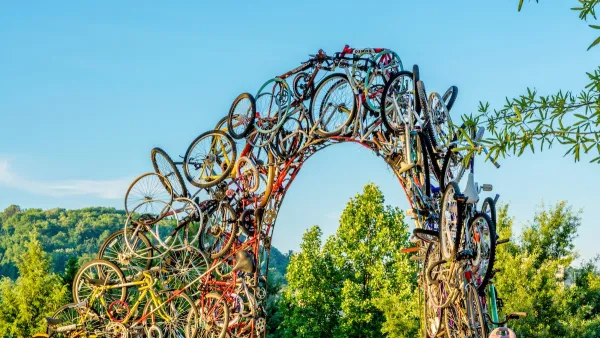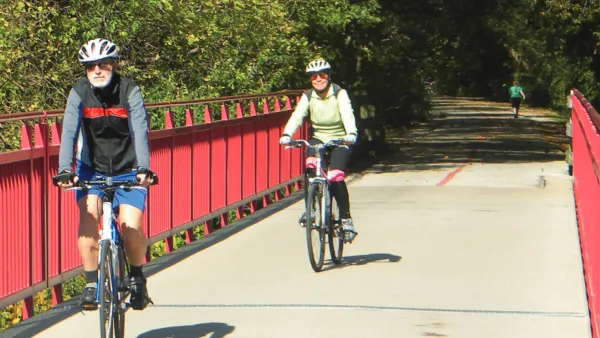A decade ago it seemed like biking and walking was making a comeback that could change the commuting culture of the United States.

Angie Schmitt spreads the word about the "Bicycling and Walking in the United States: 2018 Benchmarking Report," published semi-annually by the League of American Bicyclists.
"Pedestrian fatalities are soaring and bike commuting is leveling off nationally, despite progress in some cities and states — the latest evidence that we need leadership willing to do what works and willing to stop doing what doesn’t," according to Schmitt's summary of the report.
The contemporary trends stand in contrast to the story just a decade ago, when it seemed biking was on a "steady upward trajectory," writes Schmitt. Now biking and walking have leveled off, and many of the gains in people walking to work might be a result of more people working in post-recessionary years.
There is also institutional neglect to account for infrastructure projects that support biking an walking. "The number of new biking and walking projects being started and the total funding levels have fallen since the end of the last decade, when Obama passed his stimulus bill," explains Schmitt about findings in the report.
The article includes a call for states and the federal government to step up to support local governments in funding, planning, and constructing bike and pedestrian infrastructure.
FULL STORY: Walking and Biking are Hurt by Lack of National Leadership: Report

Maui's Vacation Rental Debate Turns Ugly
Verbal attacks, misinformation campaigns and fistfights plague a high-stakes debate to convert thousands of vacation rentals into long-term housing.

Planetizen Federal Action Tracker
A weekly monitor of how Trump’s orders and actions are impacting planners and planning in America.

San Francisco Suspends Traffic Calming Amidst Record Deaths
Citing “a challenging fiscal landscape,” the city will cease the program on the heels of 42 traffic deaths, including 24 pedestrians.

Defunct Pittsburgh Power Plant to Become Residential Tower
A decommissioned steam heat plant will be redeveloped into almost 100 affordable housing units.

Trump Prompts Restructuring of Transportation Research Board in “Unprecedented Overreach”
The TRB has eliminated more than half of its committees including those focused on climate, equity, and cities.

Amtrak Rolls Out New Orleans to Alabama “Mardi Gras” Train
The new service will operate morning and evening departures between Mobile and New Orleans.
Urban Design for Planners 1: Software Tools
This six-course series explores essential urban design concepts using open source software and equips planners with the tools they need to participate fully in the urban design process.
Planning for Universal Design
Learn the tools for implementing Universal Design in planning regulations.
Heyer Gruel & Associates PA
JM Goldson LLC
Custer County Colorado
City of Camden Redevelopment Agency
City of Astoria
Transportation Research & Education Center (TREC) at Portland State University
Jefferson Parish Government
Camden Redevelopment Agency
City of Claremont





























